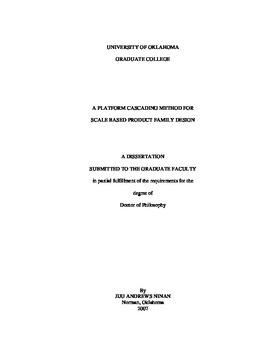| dc.contributor.advisor | Ninan, Jiju A., | en_US |
| dc.contributor.author | Ninan, Jiju Andrews. | en_US |
| dc.date.accessioned | 2013-08-16T12:20:39Z | |
| dc.date.available | 2013-08-16T12:20:39Z | |
| dc.date.issued | 2007 | en_US |
| dc.identifier.uri | https://hdl.handle.net/11244/1191 | |
| dc.description.abstract | In this dissertation, a product family design method for scale based products leveraged from multiple platforms is presented. A product family is a set of related products derived from a product platform. Product family design involves designing the platform and also leveraging the different product variants from the platform. A common approach to the product family design is to treat it as a design optimization problem, so that tradeoff analysis can be performed between commonality and individual product performance. | en_US |
| dc.description.abstract | In the evaluation stage, evaluation functions are used to evaluate the family of products leveraged from the platform. After Evaluation of the products leveraged, PCM uses a cascading formulation to generate subsequent platforms from the initial platform. Cascading generates new platform by converting the platform parameters from the previous platform to a scale parameter to leverage the set of products that have poor performance. The method is illustrated using two examples: (1) axial pump product family design and (2) universal electric motor product family design. The method can be easily implemented in gradient based optimization tools and can be used design scale based product families in a time efficient manner. | en_US |
| dc.description.abstract | A product family based on a single platform may lead to poor performance of the product family. A better approach is to leverage the products from multiple platforms. This approach offers more challenges to the designer. The designer must now determine: the optimum number of product platforms that are required, the values of platform parameters for each platform, the products that are leveraged from each platform and the value of scale parameters. | en_US |
| dc.description.abstract | In this dissertation, a Platform Cascading Method (PCM) is presented which is capable of designing the family of products based on multiple platforms. PCM is comprised of three stages: (1) Single platform stage; (2) Evaluation stage; and (3) Cascading stage. In PCM, the family is first leveraged using a single platform. The non platform scale based design problem has the structure of a Mixed Integer Non Linear Problem (MINLP) due to the combinatorial nature of the platform commonality parameters and continuous product parameters. Solving MINLPs are not straightforward and require high amount of expertise and time in solving the problem and hence transform to high product lead time. In PCM, the non platform specified product family design formulation is converted from a MINLP to a NLP by relaxing the platform commonality parameters to continuous parameters and then mathematically constraining to produce discrete results in the end. | en_US |
| dc.format.extent | xiii, 187 leaves : | en_US |
| dc.subject | New products. | en_US |
| dc.subject | Product lines. | en_US |
| dc.subject | Engineering, Industrial. | en_US |
| dc.subject | Engineering, Mechanical. | en_US |
| dc.title | A platform cascading method for scale based product family design. | en_US |
| dc.type | Thesis | en_US |
| dc.thesis.degree | Ph.D. | en_US |
| dc.thesis.degreeDiscipline | School of Aerospace and Mechanical Engineering | en_US |
| dc.note | Source: Dissertation Abstracts International, Volume: 68-04, Section: B, page: 2610. | en_US |
| dc.note | Adviser: Jiju A. Ninan. | en_US |
| ou.identifier | (UMI)AAI3261114 | en_US |
| ou.group | College of Engineering::School of Aerospace and Mechanical Engineering | |
